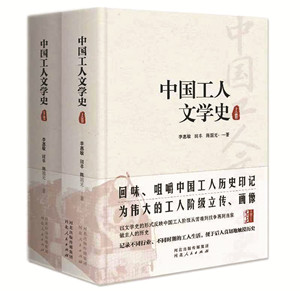


A literary biography of the great working class

The History of Chinese Workers’ Literature
The History of Chinese Workers’ Literature, by Li Huimin, an associate professor from the College of Chinese and Literature at Hebei Normal University (HEBTU), among others, represents the first conscious literary effort to document the history of the working class in China. The book aims to “taste the historical imprint of Chinese workers and create a biography and portrait of the great working class,” and “elucidate the history of the Chinese working class from suffering and struggle to being the masters of their own fate in the form of literary history.”
In the dazzling gallery of Chinese modern and contemporary literature, the image of workers has never been absent. With the development of Chinese society and the rising status of the working class, the image of workers in literature has been continuously enriched. Since Lin Chuanjia and Huang Ren began chronicling literary history in 1904, the writing of Chinese literary history has been continuous, offering a window for reflecting on literature.
However, despite the availability of various literary histories—whether period-based, thematic, or focused on imagery—no work has centered specifically on the image of workers or concentrated on writing about workers until the publication of The History of Chinese Workers’ Literature. Its profound academic and practical significance should be understood within the historical development of the Chinese workers’ movements, the evolution of Chinese society, and the historical transformation of the Chinese working class as a leading class.
After the opening of China’s doors by imperialist ships and armament, the emergence of factories gave rise to the first batch of industrial workers. Over time, the size of the industrial workforce expanded and became a significant force driving social reform. However, the agrarian characteristics of Chinese society meant that many workers remained inextricably linked with their agricultural roots. After the founding of the People’s Republic of China in 1949, the scale and status of industrial workers continued to grow. With the advancement of science and technology, industrial workers are increasingly associated with the identity of intellectuals. In fact, intellectuals are considered an integral part of the working class. The advent of the internet and AI has further blurred and diversified the identity of workers, which no longer resembles the traditional single industrial worker identity of the past.
In this context, the book should fully reflect changes in workers’ identity, examining the complexity of workers’ identity and historical transformation from the perspective of hybridity and mobility. It is hoped that the revised edition will offer this nuanced understanding of and perspective on worker identity.
Xing Jianchang is a professor from the College of Chinese and Literature at HEBTU.
Editor:Yang Lanlan
Copyright©2023 CSSN All Rights Reserved